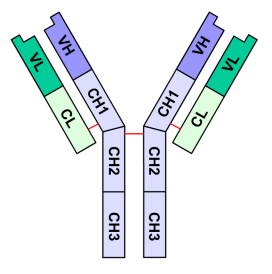Gerald Edelman
Gerald Maurice Edelman (July 1, 1929 – May 17, 2014) was an American biologist, neuroscientist, and Nobel Prize laureate. Edelman is best known for his groundbreaking work in the field of immunology, which led to the discovery of the structure of antibody molecules. For this work, he was awarded the Nobel Prize in Physiology or Medicine in 1972, which he shared with Rodney Robert Porter. Edelman's research significantly advanced our understanding of the immune system and has had a profound impact on the field of biomedical science.
Early Life and Education[edit | edit source]
Gerald Edelman was born in Ozone Park, Queens, New York City, to a Jewish family. He showed an early interest in science and went on to study at Ursinus College in Pennsylvania, where he earned his bachelor's degree in chemistry. He then pursued medical studies at the University of Pennsylvania School of Medicine, receiving his M.D. in 1954. After completing his medical degree, Edelman served as a captain in the United States Army Medical Corps, where he was stationed in Paris and conducted research at the Pasteur Institute.
Career and Research[edit | edit source]
After his military service, Edelman returned to the United States and began his research career in earnest. He joined the Rockefeller University (then known as the Rockefeller Institute for Medical Research) in New York City, where he would spend the majority of his professional career. It was here that Edelman conducted the research that would lead to his Nobel Prize-winning discovery of the structure of antibodies. This work not only provided a deeper understanding of how the immune system operates but also laid the foundation for the development of monoclonal antibodies, which are now widely used in the treatment of various diseases.
In addition to his work in immunology, Edelman also made significant contributions to the field of neuroscience. He developed the theory of Neural Darwinism, also known as the Theory of Neuronal Group Selection. This theory proposes that the development and functioning of the brain are governed by processes of selection that resemble the natural selection processes described by Charles Darwin. Edelman's work in neuroscience has been influential in shaping current understanding of how the brain develops and functions, and how complex behaviors emerge from the interactions of neural networks.
Awards and Honors[edit | edit source]
Gerald Edelman received numerous awards and honors throughout his career, in addition to the Nobel Prize. These include the National Medal of Science, awarded in 1997, in recognition of his contributions to both immunology and neuroscience. He was also a member of several prestigious organizations, including the National Academy of Sciences and the American Philosophical Society.
Legacy[edit | edit source]
Gerald Edelman's legacy is marked by his dual contributions to the fields of immunology and neuroscience. His work has not only advanced scientific understanding but has also had practical implications for the treatment of diseases and the development of therapeutic interventions. Edelman's interdisciplinary approach to science, bridging the gap between biology and neuroscience, continues to inspire researchers today.
Selected Publications[edit | edit source]
Edelman authored numerous scientific papers and several books that have contributed to the fields of immunology and neuroscience. Some of his notable publications include "The Mindful Brain: Cortical Organization and the Group-Selective Theory of Higher Brain Function" and "Neural Darwinism: The Theory of Neuronal Group Selection."
Death[edit | edit source]
Gerald Edelman passed away on May 17, 2014, at the age of 84. His death was a loss to the scientific community, but his contributions continue to influence the fields of immunology and neuroscience.
Search WikiMD
Ad.Tired of being Overweight? Try W8MD's physician weight loss program.
Semaglutide (Ozempic / Wegovy and Tirzepatide (Mounjaro / Zepbound) available.
Advertise on WikiMD
|
WikiMD's Wellness Encyclopedia |
| Let Food Be Thy Medicine Medicine Thy Food - Hippocrates |
Translate this page: - East Asian
中文,
日本,
한국어,
South Asian
हिन्दी,
தமிழ்,
తెలుగు,
Urdu,
ಕನ್ನಡ,
Southeast Asian
Indonesian,
Vietnamese,
Thai,
မြန်မာဘာသာ,
বাংলা
European
español,
Deutsch,
français,
Greek,
português do Brasil,
polski,
română,
русский,
Nederlands,
norsk,
svenska,
suomi,
Italian
Middle Eastern & African
عربى,
Turkish,
Persian,
Hebrew,
Afrikaans,
isiZulu,
Kiswahili,
Other
Bulgarian,
Hungarian,
Czech,
Swedish,
മലയാളം,
मराठी,
ਪੰਜਾਬੀ,
ગુજરાતી,
Portuguese,
Ukrainian
Medical Disclaimer: WikiMD is not a substitute for professional medical advice. The information on WikiMD is provided as an information resource only, may be incorrect, outdated or misleading, and is not to be used or relied on for any diagnostic or treatment purposes. Please consult your health care provider before making any healthcare decisions or for guidance about a specific medical condition. WikiMD expressly disclaims responsibility, and shall have no liability, for any damages, loss, injury, or liability whatsoever suffered as a result of your reliance on the information contained in this site. By visiting this site you agree to the foregoing terms and conditions, which may from time to time be changed or supplemented by WikiMD. If you do not agree to the foregoing terms and conditions, you should not enter or use this site. See full disclaimer.
Credits:Most images are courtesy of Wikimedia commons, and templates, categories Wikipedia, licensed under CC BY SA or similar.
Contributors: Prab R. Tumpati, MD

